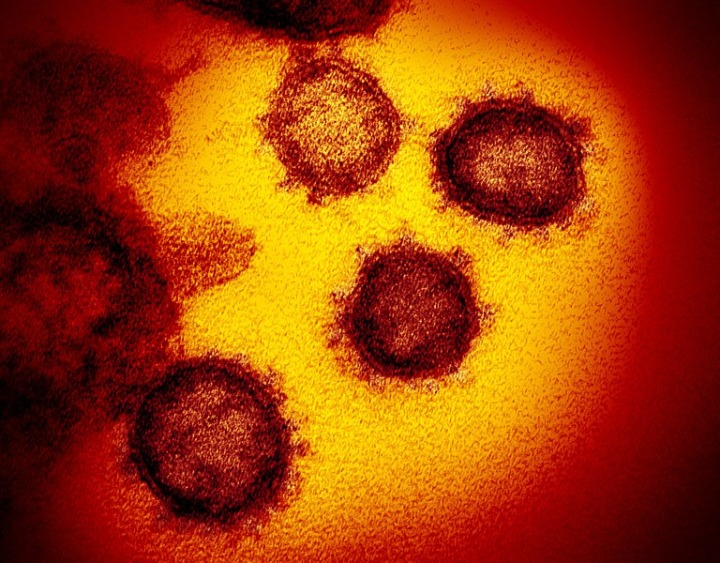過去1週間で、タンパク質のトゲトゲを持った新型コロナ・ウイルスに世界の注目のすべてが注がれている。広範囲な不安がここまで世界中の人々の生活に広がったことは、これまでほとんどなかった。現代の生活における騒音がこの痛みによって追い出されたと言えるだろう。C・S・ルイスはその痛みを「神のメガホン」と呼んだ(「神は私たちの痛みの中で叫ばれる。痛みは、耳が不自由になった世界を覚醒させるメガホンだ」)。
[toggle]Over the past week, the world has turned its full attention to the protein-thorned crown of COVID-19. It is rare to experience such a widespread global unease, in which we all find ourselves dwelling on the very same thing. In a way, the noise of modern life has been ousted by what C. S. Lewis called “God’s megaphone”: pain. [/toggle]
新型コロナ・ウイルスの透過型電子顕微鏡の画像(写真:NIAID)
たくさんの患者が死の淵に追いやられ、人々はおののいている。そして私たちは、「新型コロナ・ウイルスはただのインフルエンザの一種だ」といった傲慢(ごうまん)さや、「私たちの経済は破綻の危機にある」といった病的な恐怖感の間で行き詰まっている。
イタリアの新型コロナ・ウイルスの状況について伝える番組では、米国とオーストラリアの小児集中治療専門医がイタリアの集中治療専門医と実直に話し合っていた。それぞれの施設はこれから数週間のために必死に備えを固めている。苦しむ患者をトリアージ(患者の重症度を見分ける医療プロセス)し、何が起こるか分からない状況で治療を行うことに慣れている私たちでさえ、この真剣さはこれまでにないものだ。
[toggle]Patients are dying. People are scared. And we find ourselves stuck between the flippantly arrogant (“The coronavirus is just another flu”) and the fearfully paranoid (“We are on the brink of financial collapse”). Following Saturday’s episode of the “Italian COVID19 Experience” podcast, in which American and Australian pediatric intensivists spoke candidly with intensive care specialists in the ICUs of Italy, each of our institutions are preparing us for the next few weeks with a seriousness that is unique—even for those of us in medicine familiar with suffering, triage, and uncertainty. [/toggle]恐れを抱いて当たり前だ。私たちもそうだ。しかし、医療に携わるクリスチャンとして、私たちは今どのような対応を取るかが試されている。
キリスト教の初期、異教徒はキリスト教を「病人のための宗教」と呼んだ。私たちはそれを再び実践しなければならない。
[toggle]It’s okay to be fearful—we are too. However, as Christians working inside and outside the health care space, this is a moment where our response might distinguish us as a people who practice what was once called by early pagans “a religion for the sick.” [/toggle]そのため、デューク神学校で神学と医学、文化フェローシップについて学んだ常駐医師と医療研修生が、新型コロナ・ウイルスの大流行で得た経験をいくつか紹介したい。これは、牧師や医療関係者、神学者がヘルスケアの最前線について神学的に共同で考える試みだ。私たちは、新型コロナ・ウイルスへの対処として、「悔い改め」「奉仕」「嘆き」というキリスト教独自の組み合わせを強調したい。
[toggle]To that end, we want to share some of our experiences of the COVID-19 pandemic as resident physicians and trainees—and as fellows of the Theology, Medicine, and Culture Fellowship at Duke Divinity School, which brings together medical trainees, theologians, and pastors to think theologically at the frontlines of health care—in order to highlight the unique Christian contributions of repentance, hospitality, and lament to our preparations for the new coronavirus. [/toggle]健康崇拝についての悔い改め
[toggle]Repentance Among Idolatry of Health[/toggle]健康とは、私たちの社会において善だ。そこには正当な理由がある。預言者エレミヤは、健康を与えて傷を癒やすという神の約束について語った。またコヘレトの言葉(伝道の書)では、「若者よ、あなたの若さを喜べ」(11:9)と命じられている。使徒ヨハネは読者の健康を祈った。
[toggle]Health is a good in our society, and for good reason. The prophet Jeremiah spoke of God’s promise to bring health and heal wounds. In Ecclesiastes we are told to delight in the health of our youth. The apostle John prayed for the health of his readers. [/toggle]健康を追求し、維持することは良いことだ。しかし私たちは、「良いこと(good)」を「神(god)」と取り違えてしまったのではないか。確かに、新型コロナ・ウイルスは新しいものだが、その危険性は新しくはない。それは単に、私たちの体の健康、そして私たちが頼りにしている医療機関の能力への信頼が偶像崇拝のように大切にされてきたという静かな事実を明らかにするものだ。欧米の人々は、これまでそのように信頼しきっていたものがぐらついているのを肌身に感じている。
[toggle]While health is a good to be pursued and maintained, we sense we’ve turned a “good” into a “god.” Indeed, while the coronavirus is novel, it does not represent a new fear. It merely reveals a quiet, well-nourished idolatry toward the health of our bodies and our trust in the ability of our medical institutions to save us. The West is feeling one of its greatest idols shiver. [/toggle]臨床医は、この崇拝行為における「新たな司祭階級」となり、医師などの医療従事者は、健康熱心な人々にとっての新たな「救済」を説く事態にさえなっていると、正教会の神学者ジャン=クロード・ラルシェは主張する。その著書『病の神学』によると、現代の医療機関は「患者に対して、身体の健康やその運命の行方をすべて医師に差し出すよう奨励している。……そして、病状が回復、治癒するというただ一つの希望を医療に託し、患者たちは苦しみを耐え忍んでいる」。
[toggle]Orthodox theologian Jean-Claude Larchet goes so far as to argue that clinicians constitute a “new priestly class” of this idol, in which doctors and other health care workers minister a new “salvation of health” to devoted worshipers. In A Theology of Illness, he writes that modern medicine “encourages patients to consider that both their state and their fate lie entirely in the hands of the physician … and that the only way they can endure their suffering is to look passively to medicine for any hope of relief or healing.” [/toggle]新型コロナ・ウイルスを取り巻く混乱と「事態収束」への執着は、人々が死に対して抱く思いを明らかにしている。それは、死とは「恐ろしい出来事」であり、「社会がその人を守り損ねた結果」というものだ。私たちは不安に抗(あらが)うあまり、「比較的若くて健康な人の罹患(りかん)率と死亡率は低い」という医療関係者の言葉を引用することにもためらいがない。
[toggle]The hysteria surrounding the new coronavirus and our obsession with “flattening the curve” unmasks a deeply held belief that for any of us to die would prove both an extraordinary occasion and a failure of our society’s efforts to protect us. It should be little surprise then that in an effort to counter our anxiety, we employ the language of medical control: “the morbidity and mortality for the relatively young and healthy is low.” [/toggle]クリスチャンが最大の注意を払うように求められているのは、そのグループから最も離れた人々、すなわち高齢者や持病を抱える人々だ。
弱い人やみなしごのために裁き、苦しむ人や乏しい人を義とせよ。弱い人や貧しい人を救い、悪しき者の手から助け出せ。(詩編82:3~4)
私たち強い者は、強くない者の弱さを担うべきであり、自分を喜ばせるべきではありません。おのおの、互いを築き上げるために善を行い、隣人を喜ばせるべきです。(ローマ15:1~2)
これらの聖句は、「自分の幸福を過度に追求することは、弱者への奉仕という使命を無視することだ」と告げる。イエスは新約聖書の中で、弱者にひたすら伴い続けた。「人口の99%は新型コロナ・ウイルスにかかっても生き残るだろう」という傲慢な医学的見地に寄りかかるべきではない。私たちは羊飼いの愛を知る者として、真っすぐに「残りの1%はどうなるのか」と尋ねるべきだ。
[toggle]And yet, it is precisely the opposite population—the relatively elderly and unwell—to whom Christians are called to pay closest attention. Psalm 82 and Romans 15 make it clear that worshiping our own well-being neglects our call to the weak—those whom Christ repeatedly identifies with throughout the New Testament. It is medical hubris that tells us that 99 percent of our population will likely survive the coronavirus. But it is the love of the shepherd that asks, unashamedly, “What about the 1 percent?” [/toggle]健康は良いことだ。しかし、それは究極的な価値ではない。究極的な価値は、遺伝子組み換え技術や新しいワクチンを通じて得ることはできない。薬を発見することが私たちの賜物であり義務ではあっても、そのことは変わらない。私たちが慰めを得るのは、疫学者が打ち立てる平和の旗のもとではない。たとえ新型コロナ・ウイルスにかかって死んだとしても、私たちの人生はキリストによって知られ、守られているという事実に慰めを受けるのだ。(後編に続く)
[toggle]Health is a good thing, but it is not an ultimate thing. It is not something that we can master through biohacking or guarantee through new vaccines—even as it is a gift and a duty to seek such medicine. Our comfort ought not lie in the fact that we are protected under the banner of epidemiological peace. Our comfort lies in the fact that even if we are stricken with the coronavirus and die, our lives are known and sealed in Christ. [/toggle]